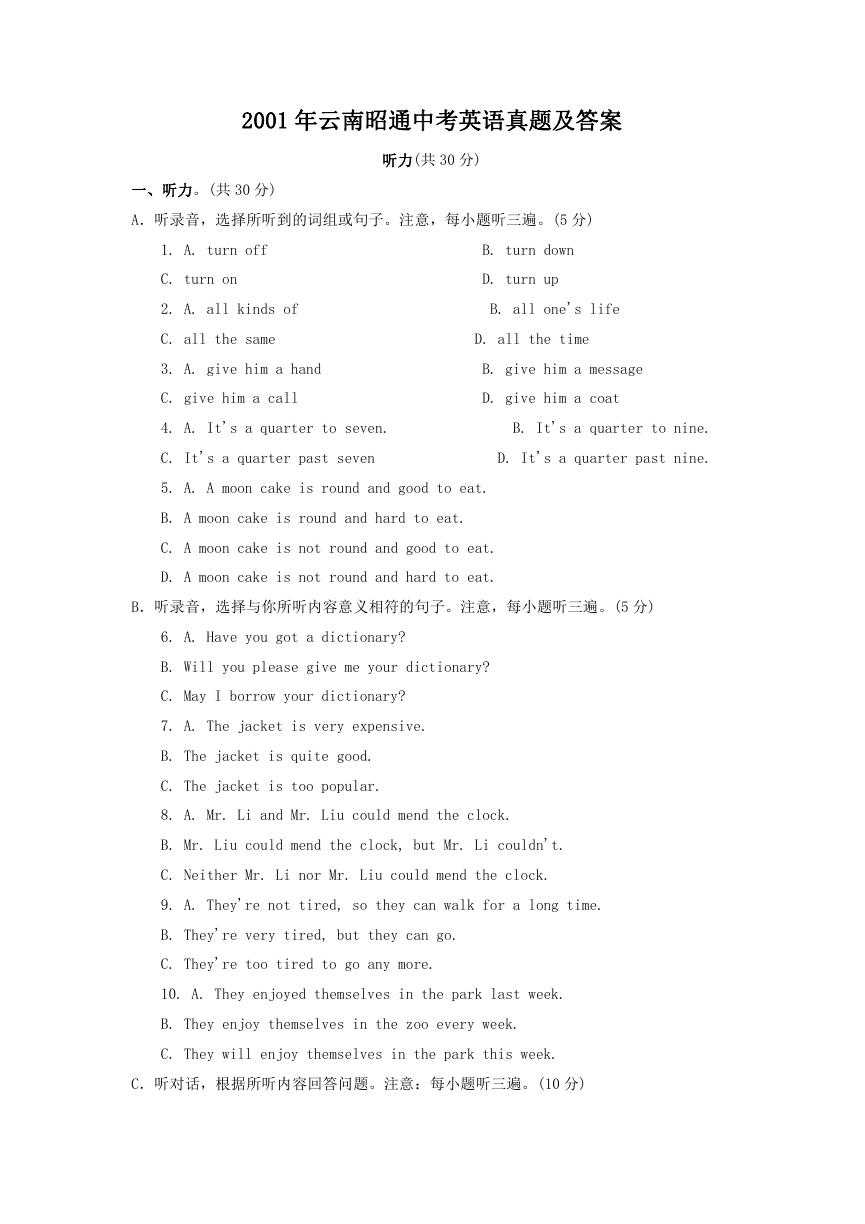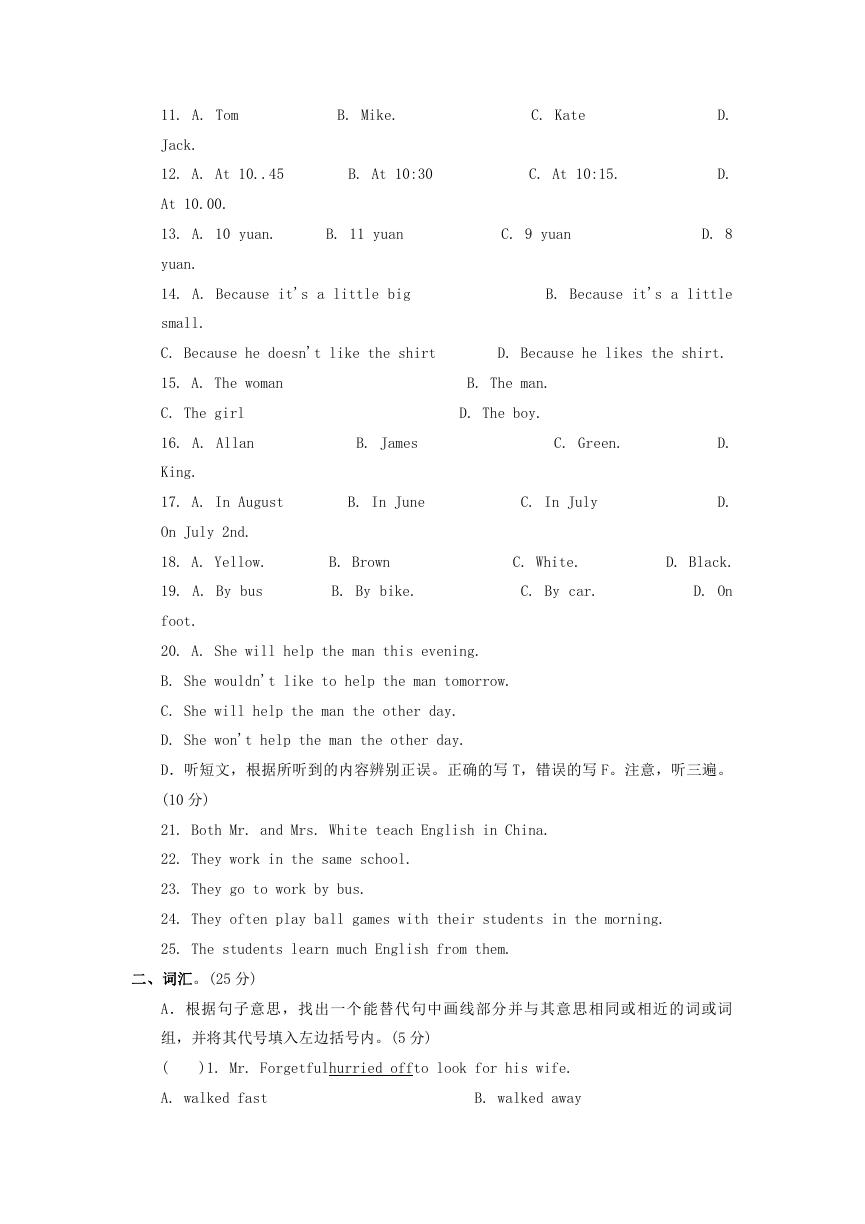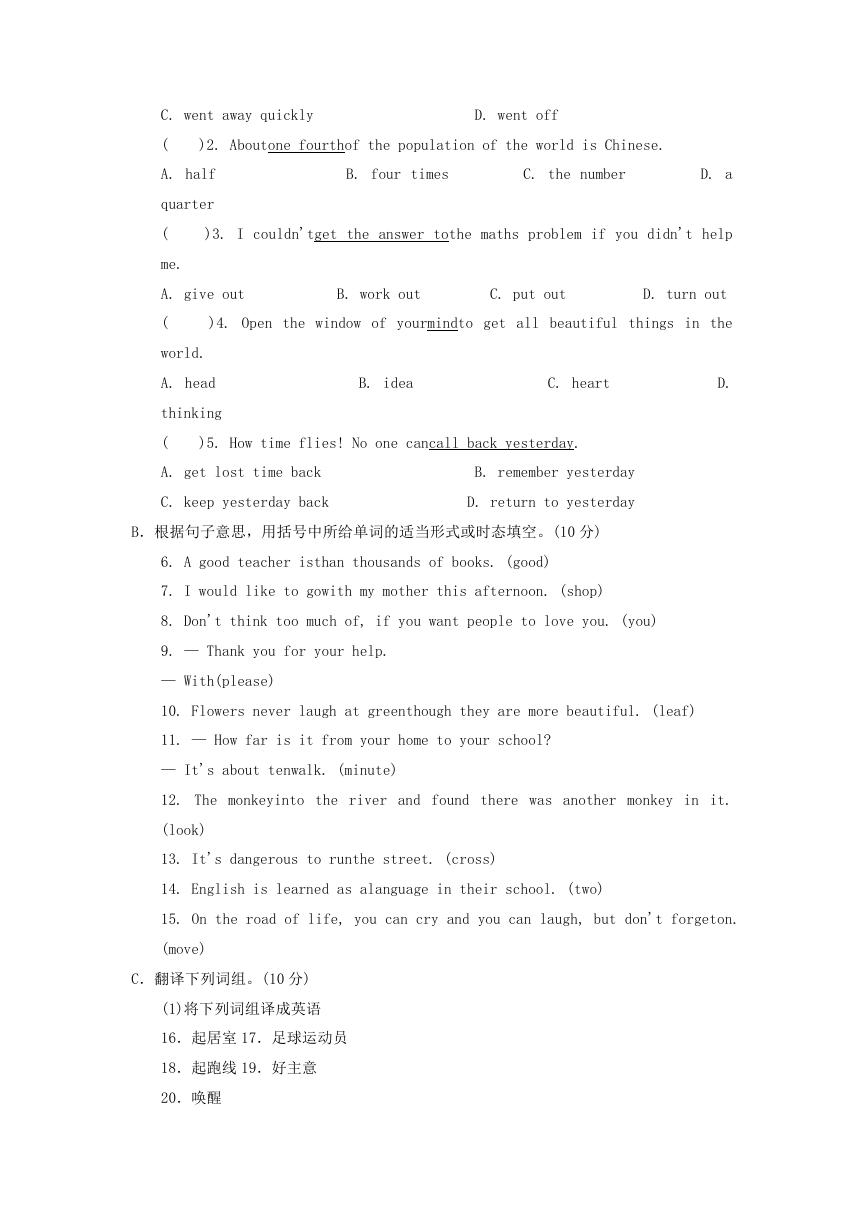2001 年云南昭通中考英语真题及答案
听力(共 30 分)
一、听力。(共 30 分)
A.听录音,选择所听到的词组或句子。注意,每小题听三遍。(5 分)
1. A. turn off
C. turn on
2. A. all kinds of
C. all the same
B. turn down
D. turn up
B. all one's life
D. all the time
3. A. give him a hand
B. give him a message
C. give him a call
D. give him a coat
4. A. It's a quarter to seven.
B. It's a quarter to nine.
C. It's a quarter past seven
D. It's a quarter past nine.
5. A. A moon cake is round and good to eat.
B. A moon cake is round and hard to eat.
C. A moon cake is not round and good to eat.
D. A moon cake is not round and hard to eat.
B.听录音,选择与你所听内容意义相符的句子。注意,每小题听三遍。(5 分)
6. A. Have you got a dictionary?
B. Will you please give me your dictionary?
C. May I borrow your dictionary?
7. A. The jacket is very expensive.
B. The jacket is quite good.
C. The jacket is too popular.
8. A. Mr. Li and Mr. Liu could mend the clock.
B. Mr. Liu could mend the clock, but Mr. Li couldn't.
C. Neither Mr. Li nor Mr. Liu could mend the clock.
9. A. They're not tired, so they can walk for a long time.
B. They're very tired, but they can go.
C. They're too tired to go any more.
10. A. They enjoyed themselves in the park last week.
B. They enjoy themselves in the zoo every week.
C. They will enjoy themselves in the park this week.
C.听对话,根据所听内容回答问题。注意:每小题听三遍。(10 分)
�
11. A. Tom
B. Mike.
C. Kate
Jack.
12. A. At 10..45
B. At 10:30
C. At 10:15.
D.
D.
At 10.00.
13. A. 10 yuan.
B. 11 yuan
C. 9 yuan
D. 8
yuan.
14. A. Because it's a little big
B. Because it's a little
small.
C. Because he doesn't like the shirt
D. Because he likes the shirt.
15. A. The woman
C. The girl
16. A. Allan
King.
B. The man.
D. The boy.
B. James
C. Green.
17. A. In August
B. In June
C. In July
On July 2nd.
D.
D.
18. A. Yellow.
B. Brown
C. White.
D. Black.
19. A. By bus
B. By bike.
C. By car.
D. On
foot.
20. A. She will help the man this evening.
B. She wouldn't like to help the man tomorrow.
C. She will help the man the other day.
D. She won't help the man the other day.
D.听短文,根据所听到的内容辨别正误。正确的写 T,错误的写 F。注意,听三遍。
(10 分)
21. Both Mr. and Mrs. White teach English in China.
22. They work in the same school.
23. They go to work by bus.
24. They often play ball games with their students in the morning.
25. The students learn much English from them.
二、词汇。(25 分)
A.根据句子意思,找出一个能替代句中画线部分并与其意思相同或相近的词或词
组,并将其代号填入左边括号内。(5 分)
(
)1. Mr. Forgetfulhurried offto look for his wife.
A. walked fast
B. walked away
�
C. went away quickly
D. went off
(
)2. Aboutone fourthof the population of the world is Chinese.
A. half
quarter
B. four times
C. the number
D. a
(
)3. I couldn'tget the answer tothe maths problem if you didn't help
me.
A. give out
B. work out
C. put out
D. turn out
(
)4. Open the window of yourmindto get all beautiful things in the
world.
A. head
thinking
B. idea
C. heart
D.
(
)5. How time flies! No one cancall back yesterday.
A. get lost time back
B. remember yesterday
C. keep yesterday back
D. return to yesterday
B.根据句子意思,用括号中所给单词的适当形式或时态填空。(10 分)
6. A good teacher isthan thousands of books. (good)
7. I would like to gowith my mother this afternoon. (shop)
8. Don't think too much of, if you want people to love you. (you)
9. — Thank you for your help.
— With(please)
10. Flowers never laugh at greenthough they are more beautiful. (leaf)
11. — How far is it from your home to your school?
— It's about tenwalk. (minute)
12. The monkeyinto the river and found there was another monkey in it.
(look)
13. It's dangerous to runthe street. (cross)
14. English is learned as alanguage in their school. (two)
15. On the road of life, you can cry and you can laugh, but don't forgeton.
(move)
C.翻译下列词组。(10 分)
(1)将下列词组译成英语
16.起居室 17.足球运动员
18.起跑线 19.好主意
20.唤醒
�
(2)将下列词组译成汉语
21. League members22. World Cup
23. the end of the century24. man-made satellites
25. a Chinese-English dictionary
三、选择填空。(20 分)
从 A、B、C、D 四个选项中选择能填入空白处的正确答案,并将其代号填入左边括号
内。
(
)1. Music makes life more beautiful. I often spendhour or two
enjoying it.
A. a
B. the
C. an
D. 不填
(
)2. — I'm going to Hong Kong for a holiday next week.
— Oh, really!.
A. You are welcome
B. Don't worry
C. Bye-bye
D. Have a good time
(
)3. Kunming is a beautiful city.foreign visitors come to visit it
every year.
A. Million of
B. Millions of
C. Million
D.
Millions
(
)4. — How about these two books?
—of them are interesting.
A. Either
B. Neither
C. Both
D. All
(
)5. — It's raining again.
— I don't like the weather.it is today!
A. How cold
C. What a cold
(
)6. — May I go now?
— No, you. Youstay here.
A. needn't, have to
C. mustn't, have to
B. What cold
D. How a cold
B. needn't, must
D. mustn't, have
(
)7. — Talking is easier than doing.
— Yes. We'd betterand. Doing should go first.
A. to talk less, do more
B. talk less, do more
C. talking less, do much
D. talk more, do less
(
)8. — Hi, Lucy! It's a long time since we met at the station.
�
—!
A. Good luck
B. That's right
C. Nice to see you again
D. Best wishes to you
(
)9. Don't ask me how old. A lady doesn't like others to know her age.
A. I am
girl
B. am I
C. is she
D. is the
(
)10. Teacherstheir students the right way to the knowledge.
A. send
(
)11.—
B. let
C. put
D. show
— Sorry. You've got the wrong number.
A. I'm looking for Jack.
B. May I have a word with you?
C. Can I speak to Mr. White, please?
D. Are you Mr. White,
please?
(
)12. Where is Mr. Black? I've something important to tell him.
Pleasehim.
A. send away
C. look after
B. send for
D. ask for
(
)13. — When were you born?
— Ah, it's a secret. I was bornChildren's Day.
A. on
B. at
C. in
D. of
(
)14. — You haven't been to Dali, have you?
—. How I wish to go there!
A. Yes, I have.
C. No, I have
B. Yes, I haven't.
D. No, I haven't.
(
)15. I'm sorry, __ I can't go with you this afternoon.
A. and
B. but
C. or
D. so
(
)16. — I'm sorry to take your pen by mistake.
—.
A. All right
C. It's nice
(
)17. —.
— Thank you. I certainly will.
A.
Please lend me your bike
B. Please help me with my homework
B. That's right
D. It doesn't matter
�
C. Please tell me your interesting story
D. Please say hello to your parents
(
)18. The little girl is very thirsty after singing. Please give herto
drink.
A. some water
C. much water
B. little water
D. many water
(
)19. "Hi" means "Hello". It'sway of saying "Hello".
A. the other
C. another
(
)20. Mary doesn't like bluered. But
A. or, Lily does
C. nor, Lily is
四、阅读理解。(30 分)
B. other
D. one other
B. and, does Lily
D. neither, is Lily
(A)
The Ladies' Club( 俱 乐 部 ) always had a meeting every Friday afternoon and
someone came to talk to them about important things. After that, they had
tea and asked questions.
One Friday, a man came and talked to the club about the food problem. "There
is not enough food in the world for everybody," he said. "More than half the
people in the world are hungry. And when they get more food, they have more
babies, so they never stop being hungry, Somewhere in the world, a woman is
having a baby every minute, day and night. What are we going to do about it?"
He waited for a moment.
One of the ladies said, "Well, why don't we find that woman and STOP her?"
根据短文内容,判断以下句子的正误。对的在括号内填 T,错的填 F。(10 分)
(
) 1. Every Friday afternoon the Ladies' Club always had a meeting to
talk about the food problem.
(
(
(
(
) 2. Not everyone in the world had enough food to eat.
) 3. Over half the people in the world never had babies.
) 4. A woman was always having a baby.
) 5. The lady didn't understand all the man's talk.
(B)
When you speak, write a letter, or make a telephone call, your words carry a
message. People communicate( 交 流 ) with words. But do you know people also
�
communicate without words? A smile on your face shows you are happy or
friendly. Tears( 眼 泪 ) in your eyes tell others that you are sad. When you
raise your hand in class, the teacher knows you want to say something or ask
questions. You shake( 摇 ) your head and people know you are saying "No". You
nod(点头) and people know you are saying "Yes".
Other things can also carry messages. For example, a sign at the bus stop
helps you to know which bus to take. A sign on the wall of your school helps
you to find the library. Signs on the doors tell you where to go in or out.
Have you ever noticed(注意) that there are a lot of signs around you and that
you receive messages from them all the time ?
People can communicate in many other ways. An artist ( 艺 术 家 ) can use his
drawings to tell about beautiful mountains, the blue seas and many other
things.
Books are written to tell you about all the wonderful things in the world and
what other people are thinking about.
根据短文内容,选择正确答案,并将其代号填入左边的括号内。(10 分)
6. People communicate mainly(主要) with.
A. words
B. smiling
C. signs and drawings
D. wonderful things
7. If you want to say something or ask questions in class, you need to.
A. shake your head
C. put up your hand
B. shake hands
D. nod
8. People also receivefrom signs.
A. letters
B. messages
C. ideas
D. books
9. Story-books, TV, radio and films can help us to know.
A. what is going on in the world
B. where to find the library
C. what other people are thinking about
D. both A and C
10. The story tells us.
A. why we smile
B. which bus we should take
C. the ways we communicate
D. why books are written
(C)
Different weather makes people feel different. It influences ( 影 响 ) health,
intelligence (智力) and feelings.
�
In August, it is very hot and wet in the southern part of the United States.
People there have heart trouble and other kinds of health problems during this
month. In the Northeast and the Middle West, it is very hot at some times and
very cold at other times. People in these states have more heart trouble after
the weather changes in February or March.
The weather can also influence intelligence. For example, in a 1983 report
by scientists, IQ(智商) of a group of students were very high when a very
strong wind came, but after the strong wind, their IQ was 10% below. The
wind can help people have more intelligence. Very hot weather, on the
other hand, can make it lower. Students in many schools of the United
States often get worse on exams in the hot months of the year (July and
August).
Weather also has a strong influence on people's feelings. Winter may be a
bad time for thin people. They usually feel cold during these months. They
might feel unhappy during cold weather. But fat people may have a hard
time in hot summer. At about 18℃, people become stronger.
Low air pressure( 气 压 ) may make people forgetful. People leave more bags
on buses and in shops on low pressure days. There is a "good weather" for
work and health. People feel best at a temperature of about 18℃.
Are you feeling sad, tired, forgetful, or unhappy today? It may be the
weather's problem.
根据短文内容,选择正确答案,并将其代号填入左边括号内。(10 分)
11.can have a bad effect(作用) on health.
A. Hot and wet weather
B. Good weather
C. Warm weather
D. High intelligence
12. People may have more intelligence whencomes.
A. a rain
C. a strong wind
B. very hot weather
D. low air pressure
13. Low air pressure may make people.
A. forgetful
B. sad
C. angry
D. tired
14. In "good weather" of 18℃,.
A. people are very forgetful
B. people can't do their
work well
C. thin people feel cold
D. people are in better health
�
















 2023年江西萍乡中考道德与法治真题及答案.doc
2023年江西萍乡中考道德与法治真题及答案.doc 2012年重庆南川中考生物真题及答案.doc
2012年重庆南川中考生物真题及答案.doc 2013年江西师范大学地理学综合及文艺理论基础考研真题.doc
2013年江西师范大学地理学综合及文艺理论基础考研真题.doc 2020年四川甘孜小升初语文真题及答案I卷.doc
2020年四川甘孜小升初语文真题及答案I卷.doc 2020年注册岩土工程师专业基础考试真题及答案.doc
2020年注册岩土工程师专业基础考试真题及答案.doc 2023-2024学年福建省厦门市九年级上学期数学月考试题及答案.doc
2023-2024学年福建省厦门市九年级上学期数学月考试题及答案.doc 2021-2022学年辽宁省沈阳市大东区九年级上学期语文期末试题及答案.doc
2021-2022学年辽宁省沈阳市大东区九年级上学期语文期末试题及答案.doc 2022-2023学年北京东城区初三第一学期物理期末试卷及答案.doc
2022-2023学年北京东城区初三第一学期物理期末试卷及答案.doc 2018上半年江西教师资格初中地理学科知识与教学能力真题及答案.doc
2018上半年江西教师资格初中地理学科知识与教学能力真题及答案.doc 2012年河北国家公务员申论考试真题及答案-省级.doc
2012年河北国家公务员申论考试真题及答案-省级.doc 2020-2021学年江苏省扬州市江都区邵樊片九年级上学期数学第一次质量检测试题及答案.doc
2020-2021学年江苏省扬州市江都区邵樊片九年级上学期数学第一次质量检测试题及答案.doc 2022下半年黑龙江教师资格证中学综合素质真题及答案.doc
2022下半年黑龙江教师资格证中学综合素质真题及答案.doc